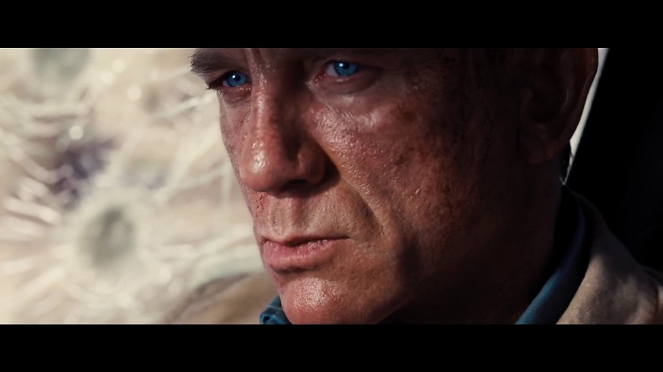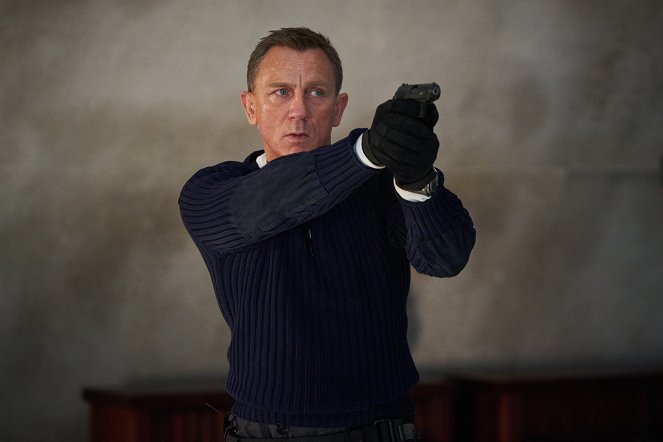Regie:
Cary Joji FukunagaCamera:
Linus SandgrenMuziek:
Hans ZimmerActeurs:
Daniel Craig, Léa Seydoux, Rami Malek, Lashana Lynch, Ralph Fiennes, Ben Whishaw, Ana de Armas, Naomie Harris, David Dencik, Rory Kinnear, Jeffrey Wright (meer)Streaming (4)
Samenvattingen(1)
Bond (Daniel Craig) has left active service and is enjoying a tranquil life in Jamaica. His peace is short-lived when his old friend Felix Leiter (Jeffrey Wright) from the CIA turns up asking for help. The mission to rescue a kidnapped scientist turns out to be far more treacherous than expected, leading Bond onto the trail of a mysterious villain armed with dangerous new technology. (Metro-Goldwyn-Mayer (MGM))
(meer)Video's (8)
Recensie (23)
At this point, Bond would just like to be James (double-o seven can no longer be James due to a reason that will cause the eyes of half of FilmBooster users to start twitching). But in order for anyone to see him that way, he will have to give up his Hemingway-esque fishing in the Caribbean and return to the job that has cost him everyone he loved in the past. No Time to Die is most satisfying as a drama about a man making up for lost years and seeking mutuality. Bond tries out new roles, which gives Craig the opportunity to deliver a more nuanced acting performance. For the intensity of the emotions that he manages to arouse on a few occasion, it wouldn’t even matter that, due to its inclination toward melodrama, the film comes across as rather sedate in comparison to the excellent and unpredictable Spectre. Except, at the same time, the filmmakers responded to the dismantling of the Bond universe in the previous instalment by trying to put Bond back together again – offering everything anyone has ever loved about the character and the franchise – which in many respects goes against the effort to create an entirely intimate and moving portrait of a tormented hero. In order for us to find out how Bond resolves his dilemma, we have to endure yet more references to the events and locations of old Bond films, embarrassing characterisations, cheesy one-liners following the elimination of bad guys, and lengthy and unimaginative action scenes, which are at times reminiscent of The Fast and the Furious in their bombast, and a bland villain whose blather about his parents is only slightly more tolerable than his blather about the plants that he grew in his garden. In the end, the thing most torn here is not Bond, but the film itself, as it simultaneously runs in two different directions. Of all the Bond films starring Daniel Craig, I am least inclined to watch this embarrassing mishmash a second time.
()
After the screening, I gave it full stars and contentedly enjoyed the reverberations of an experience overflowing with testosterone and adrenaline, only to begin to slightly waver the next day in favor of the "objective findings" that it had a rather futile villain and an often overly determined effort to tighten all the storylines from previous stints. But this is love, pure and sincere. Spectre could have been a full-on epilogue, and thankfully, it’s not. Daniel Craig came for a complex farewell in No Time to Die, brimming with big emotions that jostle for a place in the audience's good graces with an absolutely archetypal old-school Bond film, where the aforementioned villain with totally "full-retard" motivations fills his role to a tee and Q serves up the toys he mocked less than a decade earlier. Fukunaga paces it at an incredible rhythm (where is the much-mentioned mid-film tempo drop?) and keeps everything running in a completely polished and compact whole, where there is no room for peaks and valleys, but rather a thoughtful interplay of emotional outpourings and fantastic action. T. C. may be hanging under a helicopter and my jaw is dropping, but when a sweat and blood-soaked Craig climbs a staircase in one camera take, accompanied by Zimmer's thunderous music, I still know which agent with permission to replace a bulldozer will always be the most popular with me.
()
A fitting and remarkable end to Daniel Craig’s era as James Bond — something the franchise has never quite seen before. It’s both epic and deeply personal, with action sequences that are nothing short of flawless. By the end, I even found myself tearing up — a rare occurrence for me. I’ll admit, at first, I wasn’t sure what to make of Rami Malek’s villain, but as the story unfolded, through stunning set pieces in Italy, Cuba, and Norway, it all started to click. The film’s conclusion hit me so hard that I couldn’t stop thinking about Bond for days. There’s no point in saying more until you’ve seen it yourself, but if you’re a fan of Craig’s Bond, you’re in for a treat. Also, Ana de Armas was an unexpected highlight — her role was an absolute scene-stealer.
()
This time the Broccoli party played nicely on emotions. And in the role of Bond, Craig tried out the broadest range of inner developments and facial expressions not only of his five appearances in the franchise, but all of the Bond films. As an emotional viewer, I was thoroughly moved. The relationship with Léa Seydoux was nicely deepened. But what about the faulty logic in the main villain’s (Malek) motivation and behavior and the other ill-conceived things? Is it so difficult to polish the screenplay of a much-anticipated, worldwide mega-film also in this respect? A repeat viewing of Spectre the day before was helpful, and No Time to Die follows directly from it. Zimmer is excellent in the suspenseful scenes, particularly in the encounter with Blofeld (Waltz).
()
A very dignified farewell. Daniel Craig clearly enjoys the whole thing much more than in Spectre, and Cary Joji Fukunaga proves to be the perfect man to direct. No Time to Die has a great opening and an excellent ending, and it plods a bit in between, but not to the point where it hurts. Fukunaga is unlucky to have been given the task of retelling the story that was so poorly picked up by Sam Mendes in Spectre, and it was probably no fun to make sense of it all and milk some emotion out of this latest Bond flick. Fortunately, Fukunaga manages it quite well, despite Léa Seydoux being an extremely uninteresting actress and playing probably the most boring Bondgirl ever. Unfortunately, Fukunaga couldn't get rid of her, so I take it he did what he could. He's much better in scenes where he can invent new things and not work with what's left. The action is good, imaginative and different every time. And the whole No Time to Die changes its style unexpectedly and often, so that at times it's reminiscent of Craig's Bond films, at other times it makes you think of the days when Roger Moore or Sean Connery were Agent 007, and in some scenes the film can be surprisingly gritty and uncompromising. The whole thing could have been shorter, had a more prominent villain, and the middle part does drag a bit at times, but overall it's a film that's definitely worth seeing. And Craig can be happy with how he parted with his license to kill.
()




Reclame